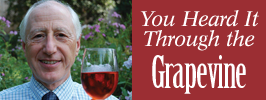The Multiple Influences on The End Result in Your Wine Glass
 I’m a firm believer in the influence of terroir (pronounced tair-wahr) on wine.
I’m a firm believer in the influence of terroir (pronounced tair-wahr) on wine.
This term encapsulates the specific local conditions having an impact on the final product in a bottle of wine: the geology of the soil; the sun exposure of a hillside or valley location; the influence of sea breezes; and the degrees of proximity to the equator.
But there are other influential sets of components that influence the final product.
- In the Old World (predominantly Europe) wines are typically referred to using the place of origin of the vineyards. In the New World (everywhere else) wines are referred to using the name of the particular grape grown to produce a wine. I believe this is helpful in defining and explaining the sense of place of a wine. It’s what differentiates a Burgundy from other Pinot Noir-based wines or a Bordeaux from other Cabernet Sauvignon-based or Merlot-based wines.
Even in the New World, however, differences abound. Why is a Cabernet Sauvignon from California different than one from Chile? Or even from Washington state? Why is there such a difference in Cabs from Napa Valley versus Sonoma County? Even within Napa Valley, there are distinct differences in Cabs from the valley floor (Rutherford) versus the hillside (Howell Mountain).
- The human factor. How a grower and/or winemaker interact with the elements of nature to optimize the quality of a grape variety is interpreted and expressed in a bottle of wine. It is this sense of place that is the most elusive of the numerous impacts on wine across all wine regions.
A winemaker’s influence can play an important role in the profile of the end product. Some winemakers expound the axiom that 90 percent of the characteristics of a quality wine are created in the vineyard while only 10 percent are influenced by the winemaker. Their philosophy: the true expression of a wine is its natural evolution on the vine, the unadulterated influence of terroir.
Then we have the New Age winemakers. Their philosophy: the terroir of nature is one component of the profile of the end product, but not necessarily the major component. Instead, the skill of the winemaker to produce a wine that meets his or her personalized expression of a particular grape should be the primary criteria.
I am firmly entrenched in the minimalist camp. I want to take in the aromas and flavors of a wine as nature intended them. I want to be able to discern the nuances of a wine produced from grapes grown on the valley floor versus the hillside, or in gravely soil versus clay-like soil. I want to form my own opinion of a particular style of wine I enjoy rather than have a winemaker force his or her preference on me.
- The influence of wine critics. For the last quarter century, we have seen the style of certain wines change dramatically from their styles of the prior millennium. This can be directly attributable to the emergence of professional wine critics and social media influencers, whose writings and opinions have become influential in swaying the general public. Once these critics garner a following, consumers seek out their style of wine.
- The profit motive of winemakers. As a corollary to the previous paragraph, certain winemakers exert their influence during the winemaking process to satisfy consumer demand. If a popular critic with a large following should prefer Cabernet Sauvignon wines that are fruit-forward, heavily oaked and high in alcohol (the opposite of most traditional, terroir-driven offerings), a number of entrepreneurial winemakers will manipulate their wines to satisfy this demand. Only time will tell if this influence is fleeting or creating a sea change in wine production.
The concept of terroir and the varying philosophies of winemakers have influenced winemaking for millennia. Formulate your individual preference profile and enjoy it as nature intended – to partake in the ethereal pleasures of wine.
Nick Antonaccio is a 40-year Pleasantville resident. For over 25 years, he has conducted wine tastings and lectures. Nick is the co-chairperson of the Wine Media Guild of wine journalists. He also offers personalized wine tastings and wine travel services. Nick’s credo: continuous experimenting results in instinctive behavior. You can reach him at nantonaccio@theexaminernews.com or on Twitter @sharingwine.
